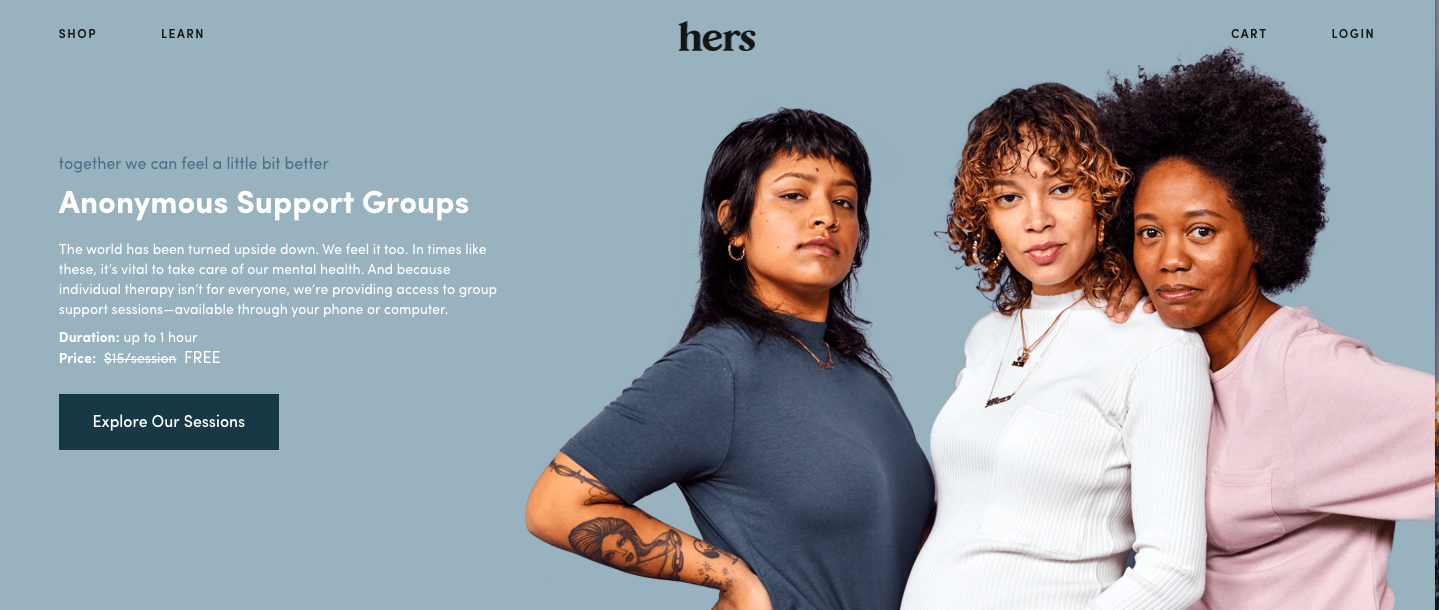Hims launches group therapy services as first foray into broader mental health initiative
Hims, the startup consumer health brand providing out-of-pocket physician services online, has launched group therapy services through its Hims and Hers brands as part of an initial push into mental health services.
The company first began exploring opportunities to expand into the mental health category around eight months ago, and accelerated its pace to respond to increased consumer demand caused by the COVID-19 pandemic.
Mental health and wellness has become a huge business opportunity for consumer startups as the stigma around seeking treatment for mental health issues has abated.
For Hims, which built its brand around the destigmatization of disorders like erectile dysfunction, and sexual health and wellness, the extension into mental health made sense, according to founder and chief executive, Andrew Dudum . "It's probably the simplest leap the company has made," he said.
"Hair loss, STDs, acne, performance anxiety" These are really medical conditions that get to your core around confidence, self-worth and stigma" these are not topics of conversation," Dudum said. "There is a big need in our customer base to help them with areas of anxiety, stress and depression" There is nothing more stigmatized than mental health."
Hims and Hers are beginning their foray into mental wellness with anonymized group therapy and guided meditation sessions that won't have the same hurdles to providing treatment that the company would have for individual therapy or text-based sessions.

Government regulations at the federal and state level require mental health clinicians to be licensed in-state, which means that the company is limited in the kinds of services it can offer before it rolls out its network.
Currently, the company has about a dozen mental health practitioners that it's working with through Regroup Telehealth, one of the largest providers of tele-psychiatry services in the country.
Ultimately, Hims envisions providing a continuum of care ranging from anonymous group therapy sessions to telemedical consultations, to in-person, video consultations and an ability to issue prescriptions to folks that need it.
Like its other services, the mental health offerings are going to be capped at the provision of some very basic services and the company won't be prescribing any medication for what could be considered controlled substances, according to the company's chief medical officer, Dr. Patrick Carroll.
"We only treat low risk patients," Dr. Carroll said. "It will be the same thing for behavioral health" the conventional screen is a PHQ9" We will have a depression and anxiety screen. For those folks that get scripts we can make sure that their prescriptions line up with the tests and screens."
That means the company won't be prescribing medications like Xanax, Ritalin, Adderall, or anti-psychotics for people with more serious conditions. "The majority of things that we will prescribe will be [serotonin re-uptake inhibitors]," said Caroll. Those are medications like Prozac, Zoloft, and Lexipro.
To ensure that the company's practitioners are meeting the requisite standard of care, each interaction with a therapist will be recorded and roughly 10% to 20% of those interactions will be audited, per company policy. "We're going to have the same quality structure in place," said Dr. Carroll. "We will have therapists as well as advisers who are going to be part of the quality review process and review encounters to make sure that the guidelines."
The group therapy sessions, which will typically cost $15, are free for the next few months as the nation struggles to cope with the dramatic social changes caused by the government's response to the COVID-19 epidemic.
Eventually the company expects to adopt a monthly subscription fee for its mental health offerings, including $50 per month for text based therapy and more customized options. Prices will cap at a few hundred dollars per month.
Unlike companies like SonderMind, which announced the close of a new round of financing yesterday, Hims and Hers mental wellness offerings won't be covered by any healthcare plan. Instead it's an out-of-pocket expense similar to the other services that the company offers.
That model appears to be working. "We have seen over 1 million patients over the platform over the past year and a half," said Dudum. "From high risk cardiovascular disease and diabetes" The medical system that has been put in place by Pat and the 300 plus physician organizations" is one that is already treating very serious conditions."
In some way, mental health is the most appropriate candidate for a telemedical offering, according to Steve Monte, a field lecturer with the Suzanne Dworak-Peck School of Social Work at the University of Southern California.
"I like to think about it as an idea whose time has come," said Monte. "Coronavirus has shed a light on how useful these services are."
Indeed, many companies already are providing virtual mental health services. Teladoc, the publicly traded telemedicine provider has a subsidiary called BetterHelp, which offers mental healthcare via the phone.
For Forerunner Ventures co-founder and managing partner, Kirsten Green, the movement into mental health by Hims was a very natural extension of the company's core thesis.
"The thing that drew me to the company was reimagining certain elements of healthcare and providing access to people," said Green. "We're not going to be able to service every medical need in this way. To the extent that there are things that can be handled in the appropriate high integrity way that can be supplied digitally we want to be able to provide that to the customer."